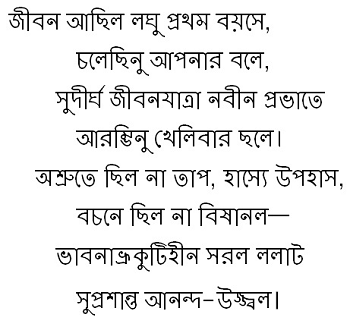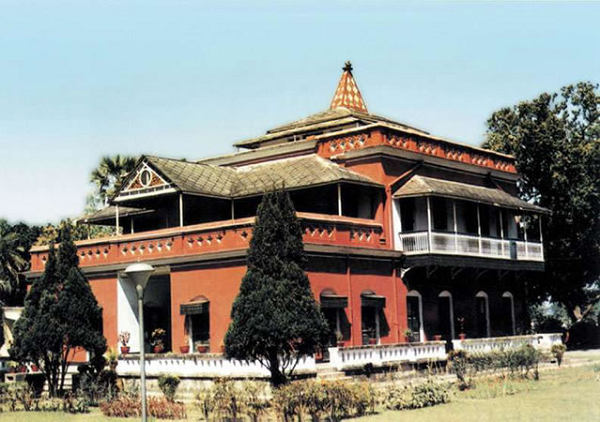Feb 03, 2026
Feb 03, 2026
Continued from Zamindar Rabindranath - 7
 This is from the poem Jibanmaddhyahna or Mid-day of life, (included in the collection Manasi,) which Rabindranath wrote in 1888 at the age of 27 when with his family he was staying at Ghazipur in what is now Uttar Pradesh. In it he tells us what his younger days were like – it was light and carefree. At the dawn of his life he had started the long journey of life in his own momentum in a playful mood - the laughter was hearty, even the tears were not bitter, the language was not barbed and his brows had not become knotted into a permanent frown from cares and anxieties – it was smooth and radiant with the sheer joy of living a smooth easy life. He passed his time composing and singing songs and writing poems. He had no burden to bear – as a boy he could be truant to drop out of the school any time he liked and as he grew up never cared much to learn a trade to earn his livelihood or build a career.
This is from the poem Jibanmaddhyahna or Mid-day of life, (included in the collection Manasi,) which Rabindranath wrote in 1888 at the age of 27 when with his family he was staying at Ghazipur in what is now Uttar Pradesh. In it he tells us what his younger days were like – it was light and carefree. At the dawn of his life he had started the long journey of life in his own momentum in a playful mood - the laughter was hearty, even the tears were not bitter, the language was not barbed and his brows had not become knotted into a permanent frown from cares and anxieties – it was smooth and radiant with the sheer joy of living a smooth easy life. He passed his time composing and singing songs and writing poems. He had no burden to bear – as a boy he could be truant to drop out of the school any time he liked and as he grew up never cared much to learn a trade to earn his livelihood or build a career.
After all attempts by his elders to make him either a barrister or an ICS failed all were worried about his future. Everybody used to say, ‘What will happen to our Robi!’ Then with all possibilities exhausted and all hopes belied in 1883 at the age of 22 he was married to a half-literate 11 years old village girl, the daughter of a poor and petty employee of their own zamindari. His young wife could hardly look after herself, yet by the time (1888) she was only 16 she had given birth to two children – a daughter and a son. There were domestic servants no doubt but at odd hours our poet himself had to serve as a baby-sitter. His allowance from the zamindari fund was only Rupees 200 per month. Fortunately he didn’t have to set up a separate household. Otherwise it would have been impossible for him to manage with that paltry sum. Now when his father asked him to take the charge of the management of the zamindaris his carefree life finally came to an end. For this onerous task he was to receive an extra allowance only of Rupees 50 per month! It is therefore easily understandable why in the next stanza of the same poem he wrote -
 - ‘with twists and turns the way became bumpy and life became more complex and burdensome.’
- ‘with twists and turns the way became bumpy and life became more complex and burdensome.’
How heavy was this burden? Let us see.
The first and the foremost responsibility of a zamindar was to deposit the government revenue assessed on his estates to the government treasury at the end of each fiscal year by a fixed date. If he failed to do that his occupation would be gone – his zamindari would be sold by public auction. And there was no appeal against this dreadful sunset law. According to one scholar for three Tagore zamindaris of Eastern Bengal the total annual government demand was not less than rupees 50,000/-. Then there was the Orissa zamindari. To fulfill this obligation he had to collect rents from his tenants in full and in time. But most of his tenants were very poor. Their holdings were small and the majority of them raised a single crop. So their income was also small. None of them could supplement it with income from sources other than agriculture, because the village industries of Bengal, which once supplied both the local and the international markets, had already been killed by the Company. The success of their agricultural operation itself depended on the vagaries of the monsoons. In years of flood and drought, which were by no means rare, they often lost their entire harvest.

They also often suffered from other adversities. After meeting all expenses for their miserable existence they could save nothing. In fact their family budget was always in deficit. Their indebtedness was also chronic. It was hereditary too. More often than not the first charge on their income was the dues of the mahajan and not the arrears of the zamindar, because the former was nearer and dearer than the latter. The times had also changed. After the Rent Act of 1859 there were no draconian regulations like the Haptam for the recovery of arrears by twisting the tenants’ arms. Neither could the defaulting tenants be ejected nor the rents be enhanced under this Act at the zamindar’s sweet will. The chaotic state of land administration of the Company regime had also changed the mood of the peasantry.
A major peasant revolt had taken place only recently in 1873 in a neighbouring zamindari. The tenants of Birahimpur mahal of the Tagores were reputed to be the most recalcitrant and troublesome. In such circumstances the‘unearned’ income of the zamindars was also ‘uncertain’ to a very great extent. Sometimes some zamindars, unable to collect enough rent from their tenants, themselves had to borrow money at high rates of interest in order to deposit the government revenue punctually to avoid the sale of their zamindaris. And like their unfortunate tenants many of them ultimately lost their estates to their creditors.
Rabindranath could opt not to attend schools or prepare himself for a gainful employment, but to lose the zamindari he could ill afford. For a very large family depended on it for its survival. According to one scholar the total number of its members at the death of his father in 1905 was 150. Fifteen years before this when the poet took charge of the zamindari that number could not have been less than 100. Year round supplies for the huge common kitchen for this huge family came from the zamindari. Various members received monthly allowances at various rates on account of which the total annual liability came to more than 50,000/- rupees. The total annual expenditure for the maintenance of the family, according to one estimate, was about two to three lakhs of rupees. There was the running cost of the zamindari. Expenditures on account of the Brahmo Samaj and many other charities were also considerable. All these were to be met from the fixed income from the zamindari. Income from some land was again earmarked to meet the expenses of the Ashram set up by his father at Santiniketan for promotion of the Brahmo sect. None except his second eldest brother Satyendranath, the first native ICS, had any independent income. We do not know if he made any contribution to the joint family. Most probably he didn’t on any regular basis. These reasons were compelling enough for the poet to be up and doing his duties properly but more compelling was his father’s vigilance over his activities. Every month he had to personally submit the accounts to his father. The old man had a very sharp memory and nothing escaped his detailed scrutiny. Any lapse or mistake had to be explained to his full satisfaction. No expenditure could be incurred without his sanction.
With much trepidation our poet faced this ordeal every month and by hard work earned his father’s absolute trust. It needs to be noted here that his father made his last will in 1889 and Rabindranath was only one of the many heirs. Some years later in 1912 his eldest brother leased out one-third of his share to Satyendranath and Rabindranath for 999 years at an annual lease rent of rupees 47,400/-. Even if they incurred losses these two brothers were legally bound to make this payment. Satyendranath being mostly away in the Bombay Presidency it was actually Rabindranath who had to remain directly responsible for this burden to the last.
Thus the burdens he took on his shoulders at the start of his zamindari career were indeed very heavy. Prior to this already he had other responsibilities which were not less heavy. For example from 1884 for many years he was Secretary of the Adi Brahmo Samaj. He had to contribute regularly to the literary journals like Bharati, Balak and Sadhana published by the Tagore family. For this at times he was so hard pressed that to finish his contribution in time he would often shut himself up in the small room on the terrace of the Kuthibari at Shilaidaha and skip meals. Extremely overworked he once fell down unconscious on the stairs. His own family also increased in size– by 1896 he had two more daughters and a son – and it was exclusively his own responsibility.
One example will be enough to show how heavy it was. He had to borrow money from his friends to meet the costs of his eldest daughter’s marriage. As we proceed in our story we shall see how he went on voluntarily adding to these burdens most of which he was not legally obliged to bear and were often against his financial interests. These kept him extremely worried and busy. It is a matter of great wonder where did he find so much time and energy to devote to his literary activities. And this was one of the most productive periods of his literary life. To him literature was not only a passion but also a kind of incurable addiction.
At that time there was a popular notion that the scion of a rich aristocratic family he wallowed in wealth and led an easy life of luxury. He had no cares and anxieties and passed his time writing poetry and singing songs. This view still persists. The above list - a list by no means exhaustive - shows how ignorant we are. What is worse, a group of contemporary petty Bengali critics, on the excuse of criticizing his works attacked him personally and their common refrain was that he was a pampered child of a rich father. We would like to know how many men of letters have been able to serve the muse with so much responsibility on their heads and create so many masterpieces under so much stress.
Continued to Zamindar Rabindranath - 9

|
Sujitsankar, Thanks for reading and commenting. |

|
Excellent ! |

|
Thank you Shaheen for reading and commenting. Rabindranath is known mainly as a great poet, but as a man he was also great. My purpose is to seek those little known facts of his life that show his greatness. |

|
Kumud, this is brilliant article! Thoroughly enjoyed reading it. |